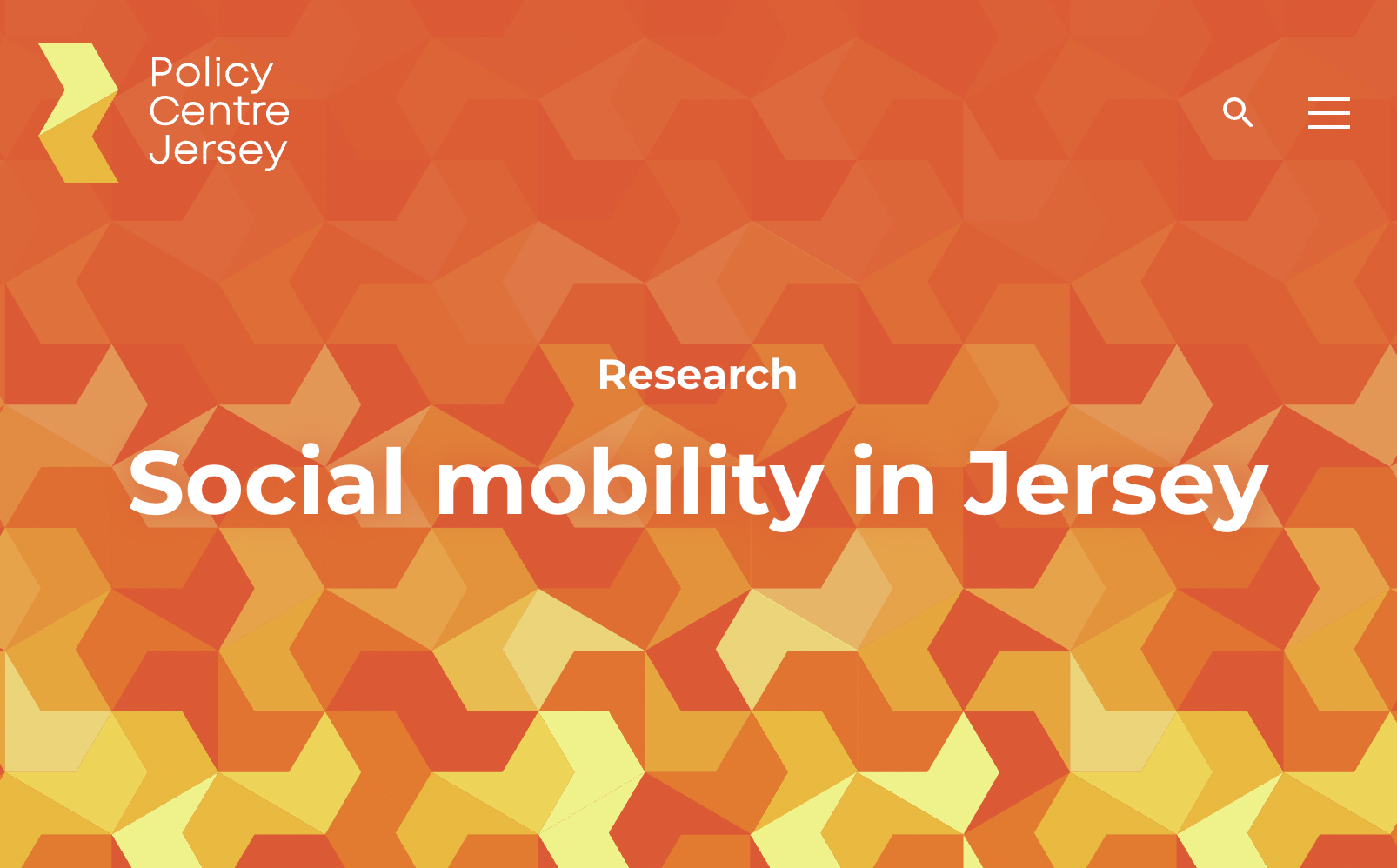


High housing costs, limited on-island university options, and an education system favouring the privileged are holding back those from disadvantaged backgrounds, a new report has said.
A report identifying barriers to social mobility in Jersey and highlighting areas for potential action was published by a local think tank earlier this month.
In the Social Mobility Report, the Policy Centre Jersey called for systemic reforms to address barriers to social mobility and improve equality of opportunity.

Pictured: Authored by the Policy Centre Jersey, the Social Mobility in Jersey report examined the impact of the housing market, university education, and the school system.
Social mobility is defined as the movement of people through a system of social hierarchy.
The think tank explained that the "Bank of Mum and Dad" is crucial in helping people meet housing costs and become homeowners.
However, many households struggle to cover day-to-day living expenses and therefore cannot afford to help their children.
This disparity is evident as 46% of social housing tenants and 34% of private tenants reported financial difficulties, compared to only 14% of owner-occupiers, according to the most recent Jersey Opinions and Lifestyle Survey.
The Social Mobility Report added that rising house prices have benefitted long-term homeowners and have allowed them to help their children with housing costs.

Pictured: Many first-time buyers can only often afford a deposit if the ‘Bank of Mum and Dad’ can help.
On the other hand, parents who have been tenants are less able to help their children with housing costs – which leads to increased income inequality.
The report highlighted that between 2000 and 2022, house prices in Jersey rose by 141%, rents by 128%, and retail prices by 102%.
Jersey's average house prices are also 122% higher than the UK average and 25% higher than in London.
The Policy Centre Jersey found that the lack of on-island university options further hampers social mobility.
In contrast to the UK, where around 20% of university students live at home to reduce expenses, students in Jersey almost always have to study abroad.
This creates difficulties for students whose parents are unable to help with the expenses of living away from home, as well as for disabled students or those with caring responsibilities.

Pictured: Social mobility involves changes in a person's socio-economic status relative to their parents or throughout their lifetime and is linked to equality of opportunity.
The report added that local providers like University College Jersey are facing limitations and need significant investment to improve facilities and offerings.
The Policy Centre Jersey explained: "Provision is necessarily limited given the small size of the market, is disjointed, and also is often seen as not having the same status as attending a UK university."
Consequently, the think tank called on the Government to expand university-level education on the island to promote social mobility and to improve co-ordination between different higher education providers.
"There is a clear need for investment in the necessary facilities for 18+ learning as well as for lifelong learning and training opportunities," the report said.
"Only when this is done will Jersey reach its full potential as a meaningful place to learn, teach and research."
The Policy Centre Jersey also criticised Jersey's selective secondary school system as a "structural barrier to achieving inclusive education" due to the transfer of pupils at ages 14 and 16 to Hautlieu and the high proportion of students attending fee-paying schools.
The report explained: "The secondary school structure does not support social mobility and needs to be reformed.
"The prevailing approach to education in Jersey is currently based on separating provision so that it aligns to the needs of different groups of children and young people.
"Whilst this approach is arguably underpinned by good intentions, it can be a structural barrier to achieving inclusive education.
"The current policy of transferring pupils at 14 to Hautlieu may have an impact on diversity within other secondary schools at a key point in students’ academic study and in the development of their self-confidence and aspirations."

Pictured: A new report from an independent think tank has shed light on the barriers to social mobility in Jersey.
The Policy Centre Jersey called for reforms to support social mobility and improve educational outcomes, especially for disadvantaged children and those on vocational pathways. It argues the four non-fee paying secondary schools should cover the cost of education provision between the ages of 11-16 at least.
The report also revealed that children with English as a second language perform significantly less well than other children, and that 66% of pupils at St Helier primary schools don't have English as a first language compared to just 14% in rural areas.
It explained: "Clearly, the St Helier schools have a more challenging task than the rural schools.
"This has been recognised with changes to the funding formula which give more resources to the schools with the highest concentration of pupils whose first language is not English."
The report also highlighted the disproportionate impact of Covid on children and young people, particularly on those with home environments that were not conducive to remote learning.
"The impact of Covid in Jersey has been tackled with the Education Recovery Programme but it is likely that some adverse effects will persist," the report said.
It added that the legally presumed age for leaving education and training is still 16 whereas in the UK and most European nations, the age is 18.

Pictured: The report critiqued Jersey's selective secondary school system as a "structural barrier to achieving inclusive education” and calls for reforms to support disadvantaged children and those on vocational pathways.
The report explained: "More generally, there seems to be a relative lack of ambition in respect of education standards in Jersey. It may be that data exist on how Jersey schools compare in respect of attainment with those in comparable jurisdictions but such data are not published.
"Aggregate data shows that Jersey schools are simply on a par at GCSE level with schools in England on average but well below schools in the South East of England. At A level attainment is actually worse than the England average and substantially worse than the best-performing areas.
"Jersey's future prosperity depends to a large extent on its educational system. Jersey should aspire at least to match the performance of the best local authorities in England not simply the average, but for this to occur comparable data needs to be produced and published as is common in other jurisdictions.”
The report also emphasised the importance of high-quality early childhood education, particularly for disadvantaged children.
It read: "Disadvantaged children tend to benefit more significantly from high-quality early childhood [education], so there is a strong case for prioritising policies to increase participation among poorer groups."
The think tank said that policies should prioritise increasing participation among economically disadvantaged groups to improve life chances and educational attainment.
The report noted that unpaid internships disadvantage young people from low-income backgrounds.
"People from disadvantaged backgrounds are further disadvantaged...70% of internships are unpaid – locking out young people who cannot afford to work for free."
It also said that employers can promote social mobility by enhancing recruitment practices, nurturing talent, and improving socio-economic diversity in the workplace.
To improve social mobility, the report recommends reducing housing costs, expanding on-island university education, reforming the secondary school system, prioritising early years education, and encouraging employers to promote socio-economic diversity.
The Policy Centre Jersey called on the Government to increase the attractiveness of and demand for higher education on-island to address the low level of aspiration among state school students and to begin the process of reforming the secondary school system.
"Addressing social mobility is not a matter for the Government alone," the report concluded.
Comments
Comments on this story express the views of the commentator only, not Bailiwick Publishing. We are unable to guarantee the accuracy of any of those comments.